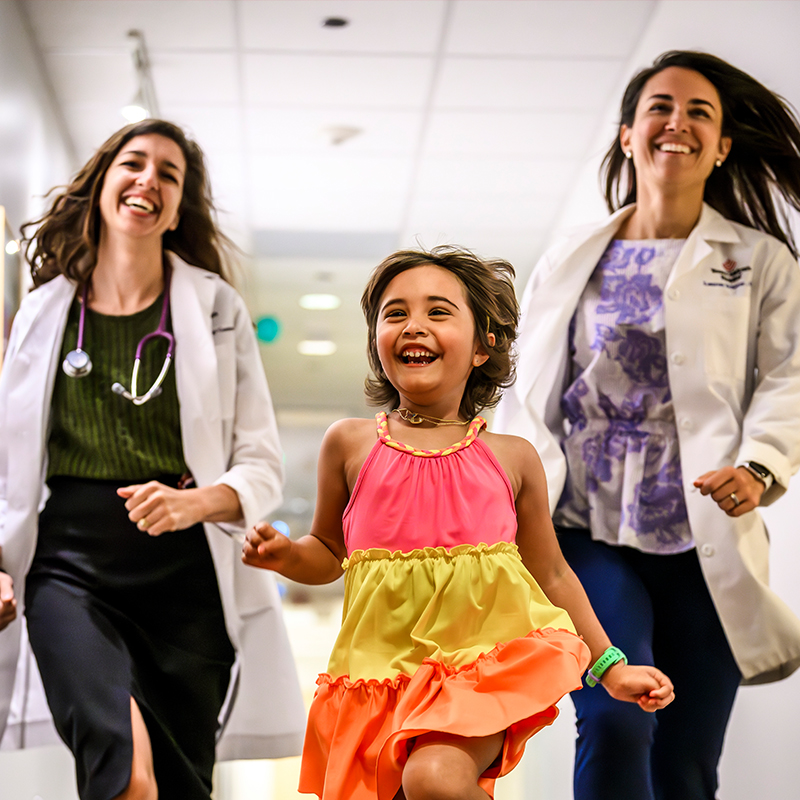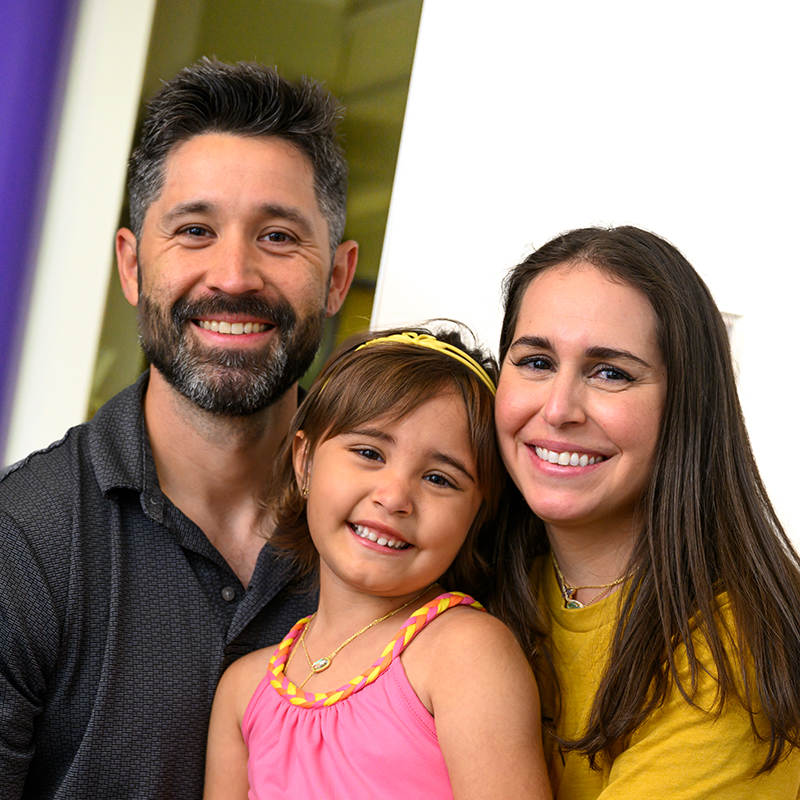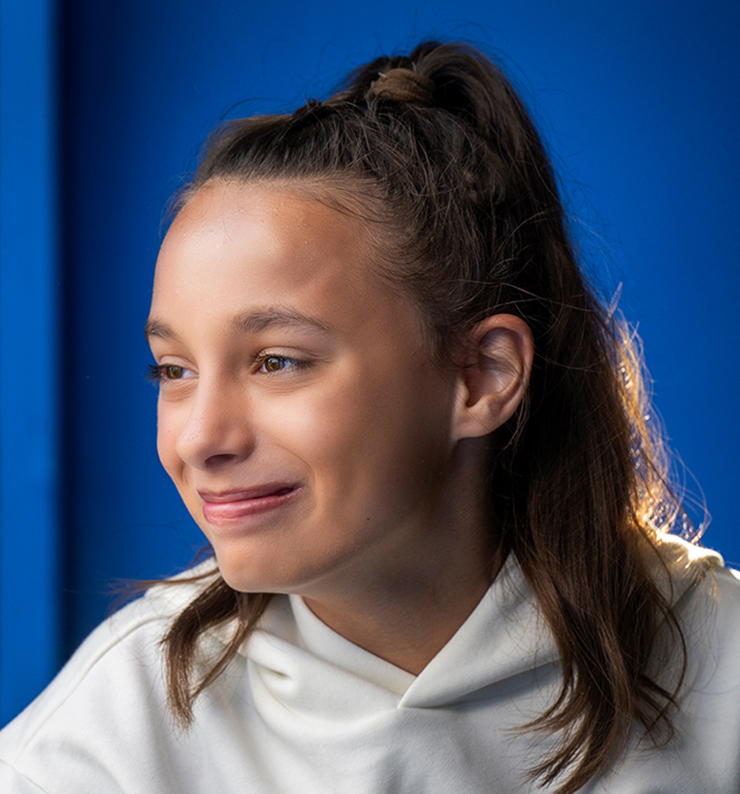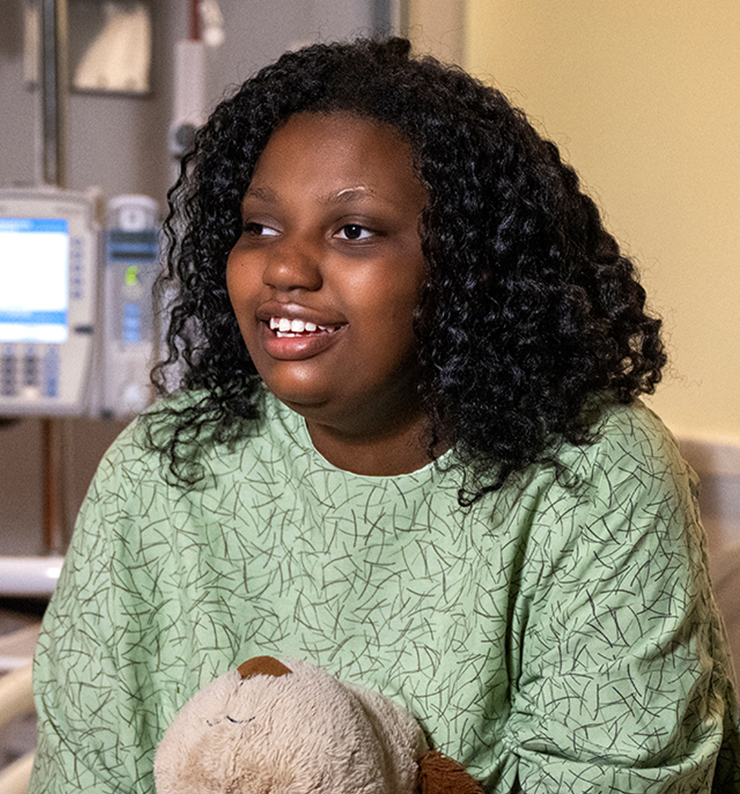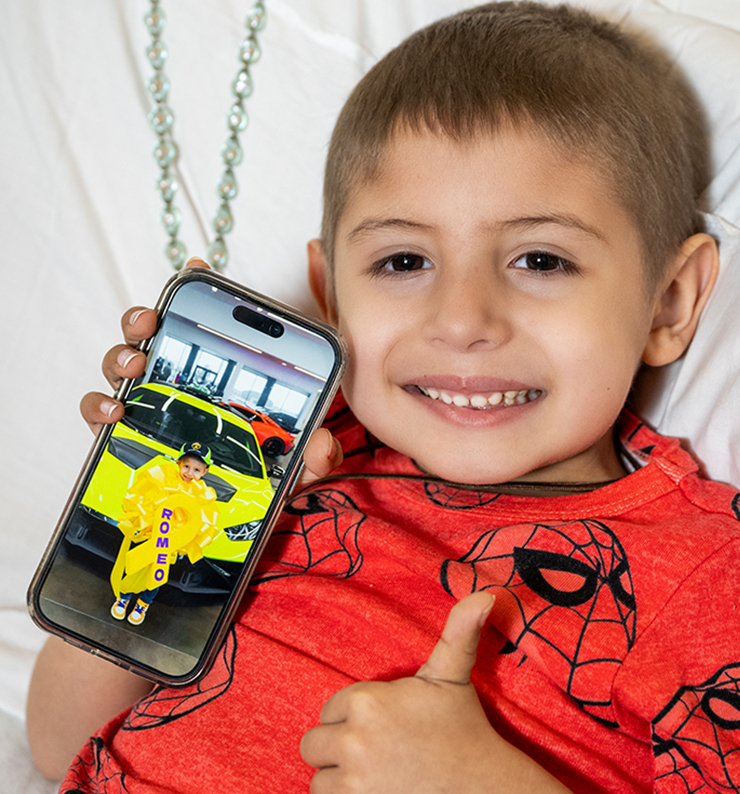Remaining Resilient through Leukemia Treatment and Encouraging Families Facing Childhood Cancer: Juliana’s Story
A six-year-old girl skips down the hallway of the Cancer Center with two of her favorite doctors. Earlier in the morning, Juliana dressed herself in a pink and yellow dress with a matching headband. At a glance, she appears like any other six-year-old, smiling and laughing, but this moment of joy hides a yearlong battle with cancer that started in the emergency room at Texas Children’s Hospital.
Juliana’s diagnosis
Just a week after Christmas in 2021, Judith noticed her extremely active daughter, Juliana, was sleeping a lot and experiencing unexplainable fevers. Her intuition told her not to wait, so she scheduled an appointment with Juliana’s pediatrician for bloodwork.
“As soon as I saw the results on the patient portal, I knew something was very wrong,” said Judith. “Her [red blood cell] levels were so low that her pediatrician recommended we go to the emergency room, and they told us to pack a bag in case we had to stay.”
While they suspected Juliana might have cancer, her parents were not sure what to expect.
In the emergency department, Juliana and her family met Dr. Meghan Shekar, a hematology/oncology fellow at Texas Children’s Cancer and Hematology Center. Dr. Shekar had to inform the family that Juliana had leukemia and needed to be immediately admitted to the intensive care unit because her blood counts were so low. She needed blood transfusions and additional testing to find out what type of leukemia she had. Juliana was diagnosed with acute lymphoblastic leukemia (ALL), and she started chemotherapy the next day.
“Dr. Shekar has been with us since literally day one and they’ve formed a really strong relationship,” said Jorge, Juliana’s father. “She’s learned a lot about Juliana on a personal level and she understands the things Juliana likes and the things that make her scared or nervous. It’s really helped that they’ve had that bond over the course of the treatment.”
Treatment and looking toward the future
While receiving rounds of chemotherapy, Juliana’s parents recall she had many rough days and weeks coping with medications, side effects, lack of energy and hair loss. However, her personality always shone through.
“Juliana is an incredibly brave, fun and wonderful little girl,” said Dr. Shekar. “Juliana has been through a lot of challenging treatment. She is now in the maintenance therapy phase, which is primarily outpatient with fewer side effects. She is getting back to the activities she loves, like dancing, seeing friends, doing schoolwork and being very active and playful.”
“These last couple of weeks she’s been having really good days where it actually almost feels normal,” said Judith. “She feels good, she wants to do things, she has energy, and she even wants to play outside in the 100-degree weather.”
Most of all, Juliana loves seeing the Facility Dogs at the hospital and going to the zoo. Right now, her favorite animals are sharks—her parents say she is glued to the TV during Shark Week.
“Juliana is a really bright and vibrant patient and she’s someone I really look forward to seeing,” said Dr. Lauren Sherer, pediatric hematologist/oncologist at Texas Children’s Cancer and Hematology Center. “Anytime you see her, even if she's feeling under the weather, she's always smiling and excited to tell you about the most recent thing she's done or experience she's had, which has been really cool to see throughout the last year and a half.”
Juliana is part of a clinical trial set to find out whether a continuous infusion of chemotherapy is better than intermittent weekly short infusions. Clinical trials, such as the one in which Juliana is participating, show how pediatric oncologists have dramatically improved the outcome and cure rate for children with cancer.
“Receiving the continuous infusion was a really good break for us, emotionally and for her, physically,” said Judith. “We’re grateful to be part of the clinical trial.”
Juliana will finish treatment for her leukemia in early 2024.
“For her specific type of leukemia, the full course of treatment is two and a half years. It’s a very long time. I’m excited and ready for her to ring that bell. It signifies so much to patients and families—you made it!” said Judith. “I can’t wait for that day to come in March.”
Supporting fellow parents
Juliana’s parents have learned a lot throughout their journey with childhood cancer, and they are passionate about reaching out to families whose children receive a cancer diagnosis.
“Since we entered this journey, we’ve come across a lot of people in the same position we are in,” said Judith. “The community and the support are amazing, and we all stick together.”
Juliana’s parents strongly recommend reaching out for information and for help.
“At first, [parents] are going to feel really lost and unsure, but there are a lot of people and resources out there to help,” said Jorge. “I urge parents to do research. Start with the doctors in the hospital; they’re more than willing to answer any question you have. Ask a lot of questions and don’t be afraid to keep asking until you have a good understanding.”
They would also like to normalize the difficult parts of childhood cancer treatment, and they want to make sure parents feel supported.
“A lot of people see the big events through childhood cancer treatment, like infusions or ringing the bell, but what they don’t see are the days at home and there are a lot of struggles that come with that,” said Jorge. “Sometimes you may feel like it shouldn’t feel so hard, but it is definitely normal. I want other parents to know they’re not alone in feeling like they’re alone.”
Learn more about Texas Children’s Cancer and Hematology Center.
